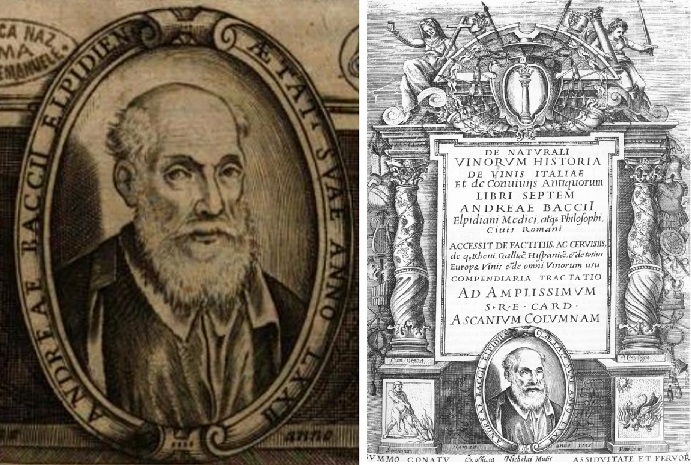The Italian physician and naturalist Andrea Bacci (1524-1600) from Sant'Elpidio a Mare in today's Marche region studied medicine in Siena and Rome, where he was promoted by Modestino Cassini, the personal physician of Emperor Maximilian II (1527-1576). Later Bacci became the personal physician of Pope Sixtus V (1521-1590). He particularly recommended the wines from Liguria, e.g. the Rossese variety, to which he attributed almost magical powers and said " that they could even make stones blossom". He taught botany and pharmacology in Rome and wrote numerous pharmacological and toxicological writings. In his main work on natural history, "De Naturalis Vinorum Historia", he described Italian wines from many regions. He reports that the Carthaginian commander Hannibal (247-183 B.C.) cured the tired horses of his army by drinking a large quantity of Conero (today DOC Rosso Conero) when marching against Rome. He also praises the excellent wines of Abruzzo and calls Sardinia the "island of wines".

He praises a wine from the village of Cirella (today's region of Calabria) already mentioned by the Greek historian Strabo (63 BC to 28 AD) with effusive words. "In the village of Cirella, not far from the river Lao, they produce two kinds of wine, light and red. The first variety, called wine of Cirella, has taken the name of Chiaretto (rosé wine) because of its brightness and body, and because, as far as clarity is concerned, it could compete with gold. Among the other wines it has the merit of keeping for two or three years, and it deserves to be called the unique example of a more exquisite wine; it is therefore considered common at common tables and among innkeepers; it is exceedingly agreeable to the palate and stomach; it slips quickly into the first veins and up to the kidneys; it is very nourishing; it produces good and thin blood; it conducts the residue of the humours of the body into their natural channels; it is diaphoretic and uriniferous; and it expels kidney gravel. It does not go to the head, but rather invigorates all the senses and wonderfully drives the minds of the old and the drowsy to profound speculations. It exhilarates heart and soul." See also under Literature.
Andrea Bacci: Di Andrea Bacci - archive, Pubblico dominio, Collegamento
Voices of our members

I have great respect for the scope and quality of the wein.plus encyclopaedia. It is a unique place to go for crisp, sound information on terms from the world of wine.
Dr. Edgar Müller
Dozent, Önologe und Weinbauberater, Bad Kreuznach